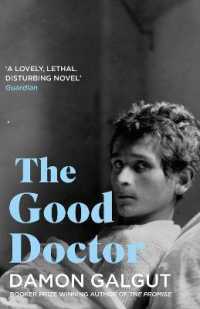- ホーム
- > 洋書
- > 英文書
- > Literary Criticism
Full Description
Showing the political importance of play in postwar French literature
In postwar France, authors approached writing ludically, placing rules and conditions on language and on the context of composition itself. They eliminated "e's" and feminized texts; they traveled according to strict rules and invented outright silly public personas. The Politics of Play: Oulipo and the Legacy of French Literary Ludics is a comprehensive examination of how and why French authors turned to these ludic methods to grapple with their political moment.
These writers were responding to a range of historical upheavals, from the rise and fall of French feminist and Third-Worldist groups to the aftermath of international socialism both at home, in the former Parisian Belt and in France more broadly, and abroad, in post-Yugoslavia Balkan states and elsewhere. Juxtaposing an array of case studies and drawing on cross-disciplinary methodologies, Aubrey Gabel reads three generations of the formalist literary group Oulipo, including Raymond Queneau, Georges Perec, and Jacques Jouet, alongside writers not traditionally deemed ludic—or sometimes not even conventionally known as novelists—such as the lesbian activist-writer Monique Wittig and the editor FranÇois Maspero. Gabel argues that literary ludics serve as both an authorial strategy and a political form: playful methods allow writers not only to represent history in code but also to intervene creatively—as political actors—in the fraught social fields of postwar France.
Contents
Introduction
PART I: Ludics Against Commitment
Chapter 1. Deflection Strategy: Oulipo's Open Secrecy and DÉgagement
Chapter 2. Coded Speech: Perec's La Disparition and Narrating Contemporary Histories
Chapter 3. Invasive Procedures: Monique Wittig's Radical Literary Materialism
PART II: Ludics After Communism
Chapter 4. Worksite Poetics: Jacques Jouet's Communist Convalescence
Chapter 5. Amateur Encounters: FranÇois Maspero's Ex-Communist Novel-Travelogues
Coda: MichÈle Audin and the Women Writing After Oulipo
Acknowledgments
Endnotes
Bibliography








